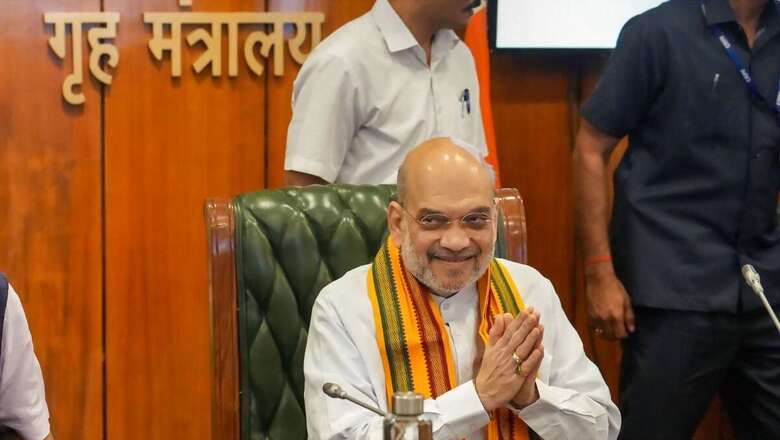
views
Assam is expected to remove the Armed Forces (Special Powers) Act or (AFSPA) completely from the state by the end of this year. This achievement again highlights the tightening of the internal security measures taken in India after Jammu and Kashmir saw a significant drop in terror activities with abrogation of Article 370 on August 5, 2019.
The current data trend indicates that the comprehensive security measures taken by Union Home Minister Amit Shah, including troop deployment to handle the insurgency threats, are showing significant effect. Dip in terrorism and extremism means growth and development.
Assam, once the hotbed of extremism and insurgency in the north-eastern India, has gradually seen terror tentacles being effectively neutralised. Most of the extremist and separatist groups are either eliminated or their leadership is forced to surrender or come to the dialogue table or flee, be it the United Liberation Front of Assam (ULFA), or National Democratic Front of Bodoland (NDFB) and Kamtapur Liberation Organization (KMO).

The terror data and fatalities show the state is reaching a safe position where it is possible for the government to recommend withdrawal of the AFSPA.
Addressing the inaugural run of Northeast’s first Vande Bharat in Assam, linking Guwahati to West Bengal’s New Jalpaiguri in May, Prime Minister Narendra Modi had highlighted how the Northeast was devoid of development for a long time. “Connectivity to the Northeast was not considered a priority by previous governments at the Centre. But that has changed in the past nine years (of Bharatiya Janata Party’s rule at the Centre), and connectivity in all sectors, including railways, has increased manifold." Recently, Assam Chief Minister Himanta Biswa Sarma stated how PM Modi visited the Northeast “60 times" and travelled to every nook and corner of the region.
IN ASSAM
The AFSPA gives armed forces special powers to maintain peace in disturbed areas affected with militancy, extremism and separatism. Many critics call the act draconian as it gives armed forces sweeping powers. Based on reasonable suspicion, the members of the armed forces, where the AFSPA is in place, can arrest anyone or can search any place without warrants.
The act says the armed forces can open fire “if they are of opinion that it is necessary to do so for the maintenance of public order, after giving such due warning as he may consider necessary, fire upon or otherwise use force, even to the causing of death, against any person who is acting in contravention of any law or order for the time being in force in the disturbed area prohibiting the assembly of five or more persons or the carrying of weapons or of things capable of being used as weapons or of fire-arms, ammunition or explosive substances".
The act was first imposed in Assam in November 1990. Since then, it has been extended 62 times. On April 1, 2022, the state areas under AFSPA cover were reduced to nine districts and one sub-division of one district. The cover was further reduced to eight districts — Tinsukia, Dibrugarh, Charaideo, Sivasagar, Jorhat, Golaghat, Karbi Anglong and Dima Hasao.
I met Hon’ble Union Home Minister @AmitShah ji at his residence today to discuss the roadmap for the complete withdrawal of the Armed Forces Special Powers Act from Assam. The Government of Assam will take further steps based on the suggestions of Hon’ble Home Minister— Himanta Biswa Sarma (@himantabiswa) September 4, 2023
SINGLE-DIGIT FATALITIES
As per the Ministry of Home Affairs (MHA), the state saw 3,842 extremist incidents between 2001 and 2010. On an average, that comes to be 384 extremist incidents a year. In these 10 years, the state saw 1,891 civilians being killed and 253 security forces personnel martyred. In the counter-insurgency operations, security forces killed 1,556 extremists, which means 156 extremists were killed in security operations every year. A total of 2,857 extremists were arrested, while 6,842 surrendered in this period. The rounded-off average comes to 286 arrests and 684 surrenders annually.

That changed drastically to single digits in many years of the past decade. Extremist incidents were reduced by 73%, if we compare the cumulative figures of the last decade to the previous decade. Between 2011 and 2020, the state saw 1,020 extremist incidents that comes to around 100 incidents a year.
A total of 100 extremist incidents can be a big block in removing AFSPA, if the resultant disaster from them is worrying. The increasing security mechanism in the state did not allow it to happen.
At least 301 civilians were killed, while 36 security forces personnel were martyred during these 10 years. On an average, that comes to 30 civilians and 4 security forces personnel killed every year in the extremist operations, a huge drop of 84% and 86% respectively, decade-wise.
AMIT SHAH’s MEASURES WORK, PEOPLE FEEL MORE SECURE
High extremism in the state in the initial decade of this century gradually waned over the past decade. How the state-wide terror network shrank could be gauged by the number of extremists killed or arrested. Once their number was in the range of several hundreds, now with their network almost eradicated, the state saw 20 extremists killed since 2019 and 315 arrested. Instead, most of them are surrendering.
On average, around 500 extremists surrendered in the state from till 2019. That went to around 2,000 extremists surrendering in 2020. From 2020 to 2022, the state saw surrender of 5,908 extremists.
Post 2019, the number of civilians killed has been reduced to 16 in the three-year period from 2020 to 2022. No security force personnel has been killed in the state since 2019 and last year was impressive on this front, with zero civilian and security forces fatality.
The ULFA, a once-dreaded Assam-based terrorist and separatist group, now stands on the brink of extinction, with its leader, Paresh Barua, rumoured to be in hiding in the borders of China. Similar is the fate of other extremist organisations like the NDFB or the KMO. The groups once officially categorised as “unlawful associations" and/or “terrorist organizations" under the Unlawful Activities (Prevention) Act of 1967 by the Ministry of Home Affairs have been effectively neutralised.




















Comments
0 comment